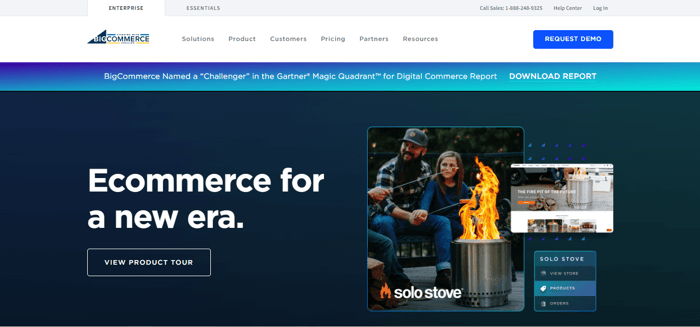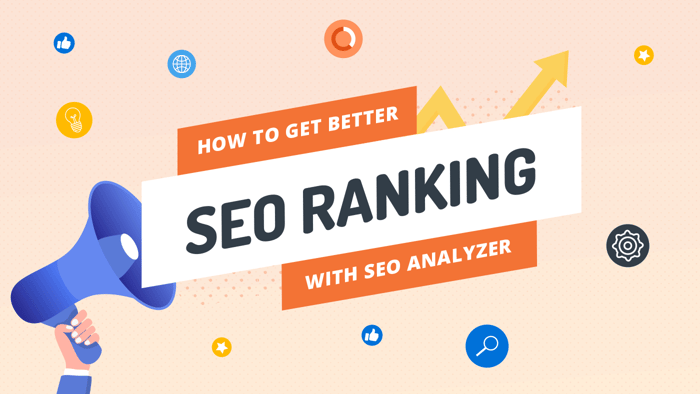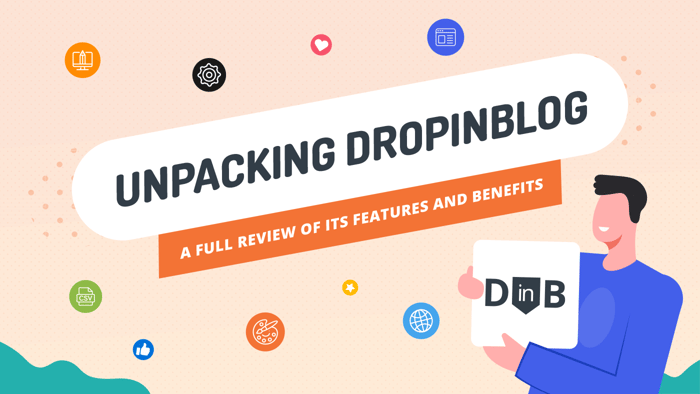Volusion and BigCommerce are cloud-based, one-stop e-commerce platforms and in today's Volusion vs. BigCommerce review we put them side by side.
Volusion was founded in 1999, so it’s been with us for quite some time. 2019 was a rough year for the platform, but more on that later. Volusion claims that it’s been home to more than 180,000 entrepreneurs from every corner of the world.

BigCommerce was founded 10 years later, in 2009. It started as a platform similar to Shopify, geared mainly toward startups and small businesses. Over time, it changed its course and began focusing more on B2B e-commerce, global sellers, and larger businesses. According to BigCommerce, more than 60,000 brands run their business on the platform.

Volusion is a hosted e-commerce solution, just like BigCommerce. As part of the same market, they have many other things in common. However, building and running your e-commerce store on one or the other will be quite different. There are many things that merchants need to take into account before they make a decision about which of the two is the better option for their business.
The purpose of this article is to help merchants make a more informed decision. So, let’s dive into our Volusion vs. BigCommerce comparison and explore the nitty-gritty of these two platforms.
Table of Contents
A Short History of the Volusion Data Breach
Potential customers have the right to know about any problematic or concerning part of any e-commerce platform. That’s why we think it’s important to say a few words about the big Volusion data breach and the aftermath.
Hacker Attack and Bankruptcy
Volusion was a target of a cyber attack in September and October 2019. Through a technique called code injection, hackers managed to add malicious JavaScript code to the regular Volusion code and steal information from many Volusion clients and their customers (for example, credit cards and personal data).
It was confirmed that 6,589 Volusion stores were victims of this malicious attack, although some reports claimed that the number was much bigger – about 20,000. The attackers stole and then sold hundreds of thousands of credit card records on the dark web (the overall number of records was estimated to be 20,000,000), inflicting enormous financial damage.
As a consequence, Volusion filed for Chapter 11 bankruptcy in order “to address an unstable capital structure involving matured debt,“ as Volusion expressed in a short article. Chapter 11 doesn’t mean going out of business but rather regrouping the company. In this scenario, the debtor agrees to reorganize the company and pay off the debts gradually.
Getting Out of Bankruptcy and the Aftermath
In January 2021, Volusion published another announcement in which it stated that the company had dealt with the bankruptcy problem successfully. It also announced that it had started a process of making the platform even better than before.
However, since this was a serious incident, the consequences of it couldn’t just disappear. The Volusion data breach became a reason for concern for the company’s customers as well as its partners. Many of the problems resulted from a misunderstanding of what Chapter 11 meant.
However, the real issue was regaining the people’s trust and coping with customers’ migration to other platforms. These are things that Volusion had to deal with then and is still dealing with now.
When we’re talking about security-related issues, there isn’t any 100% hack-proof software out there, and any company could conceivably be the victim of a similar attack. While we thought that these issues are a caveat you need to know about, it’s worth pointing out that this incident does not define Volusion as a platform. Other variables need to be taken into consideration when evaluating this platform, and that’s exactly what we’re going to do next.
Who Should Use Volusion?
Volusion’s strong side is the back-end business management rather than its website-building capacities, so it would be perfect for merchants who appreciate having detailed data and analytics for their business at all times. Additionally, its inventory management system is pretty impressive and would be perfect for small businesses that sell physical goods. It’ll make syncing everything very seamless and fast.
Who Should Use BigCommerce?
BigCommerce is a multifaceted platform that can be used by small and medium businesses alike. It can grow with you up to a certain point and provide great support for your business with its built-in features alone. Similar to Volusion, it’s great at inventory management, and any type of business can benefit from it because it supports selling different kinds of products. BigCommerce’s strong suit is its versatility, but it’s not as easy to navigate as its biggest competitor, Shopify.
Features
Now that we went over the introductory bits, let's dive deeper into our Volusion vs. BigCommerce comparison, starting with a detailed overview of their features.
Volusion
Uptime Guarantee
One of the best things about Volusion is that it gives a 99.9% uptime guarantee. Overall, the platform puts a lot of emphasis on hosting. According to Volusion, the company invested a lot of money in providing the best hosting experience for its clients. It runs on the Google Cloud Platform, which guarantees a smooth user experience.
Design and Customization
When it comes to design, the platform offers a visual drag-and-drop editor and responsive themes to customize the look and feel of your store. There are 45 themes, 11 of which are free, while the paid ones are all priced at $180. There aren’t too many options, but the themes all look solid, and they’re all mobile-responsive. Additionally, if you’re code-literate, Volusion gives you access to the HTML/CSS editor to customize your site even further.

The style editor is relatively simple, so you shouldn’t expect it to be on par with Wix or Squarespace, despite being basically “an elder” in the website-building world. Even though Volusion promises a lot on the design front, the style editor will hardly be enough if you’re looking to get more creative (unless you know code). For more basic purposes, though, it could work quite well. This is what it looks like:

You can pick a theme, add your logo, upload products, add navigation and CTAs (calls to action), change colors and fonts, do some more basic customization, or write your own CSS code in the advanced CSS editor.
Honestly, there aren’t that many options, and the editor is not the most modern or intuitive in the world, especially because when you edit, you have to constantly switch between the front and back end. However, if you prefer simplicity in terms of design and don’t mind working with a slightly difficult UI, you’ll probably like Volusion's approach because their editor is still a good product.
E-Commerce
As far as e-commerce features are concerned, Volusion offers a lot of them out of the box, which is admirable. You get most of the features you need to run a business without needing to integrate with other apps. There’s a dashboard that shows data related to your sales, and it looks fairly good:

You also get access to different types of reporting like ROI (return on investment) and affiliate-related statistics. Additionally, you can integrate with Google Analytics and Google Ads for even more detailed info on how your site is performing, like top landing pages, social media engagement, site traffic, SEO performance, and much more.
Products and Shipping
Similarly, there is no shortage of product and shipping management. Volusion makes it easy to keep tabs on the inventory because it allows you to set up warehouse locations and assign different products to those locations. On your dashboard, you’ll have a comprehensive overview of the status of the products and their quantities, so you’ll know when it’s time to restock and have the numbers automatically update when an item is sold.
Volusion also supports adding different variants of a product and setting up different prices for each. You can choose to have the prices displayed in different currencies according to the locations of your customers. However, Volusion doesn’t support digital products, so if this is what you sell, you’d better look elsewhere.
As for the shipping, with Volusion, you can offer special shipping discounts and offer estimated delivery dates. The taxes for the US are automatically calculated, which is very useful, and they show up at checkout. The kinds of shipping you can offer are free shipping, flat rate, and special rate. There is also a live rate calculator that connects to some major shipping carriers.
Marketing and SEO
Similar to other business software, Volusion allows you to send automated abandoned cart emails and show product recommendations to customers. You’ll also be able to add product reviews to each page to increase interest, as well as enable social sharing and offer notifications for product availability. Additionally, you can create gift cards, coupons, and discounts, and you can sell on multiple channels, like Amazon, Facebook, eBay, and Google.
Volution’s SEO functionality is also solid. You can manage all the SEO metadata from one place and edit the SEO fields (meta description, URL slug, alt image tag, page title, and keywords) for every product page, which gives you great control.
The one area where Volusion falls short, though, is that it doesn’t have blogging functionality. It may be just one thing, but it’s a very important one. If you want a blog on your site, you’ll have to integrate with a third-party app.
Payments
Volusion allows you to accept payments from most major credit and debit cards, like Visa, Mastercard, Discover, and American Express. As for payment gateways, Volusion has its own native payment processor called Volusion Payments, which is only supported in the US.
If you’re outside of the US or prefer to use something else, you can also integrate with PayPal, Stripe, NMI, and Authorize.net, though keep in mind that there will be fees, unlike with their native payment processor.
Volusion Studio
Volusion Studio is Volusion’s in-house design and marketing agency, which is like a separate product. They offer a free website checkup to see how your site is performing and where you could step up your game, as well as give you a few pointers. However, their main product is providing companies with marketing services and helping them increase their revenue and visibility by improving their business strategies.
BigCommerce
BigCommerce is one of the best hosted e-commerce solutions. It’s right there at the top with Shopify. It’s been very successful in attracting new customers and encouraging users to move from other e-commerce platforms to BigCommerce.
One of the things that the platform is widely known for is the huge number of tools available out of the box. Another advantage of BigCommerce is that it’s a very innovative company. It constantly works on new additions to its already rich and high-quality assortment of tools. It also boasts excellent security features, which is especially important in light of Volusion’s recent history.
Design and Themes
BigCommerce has the look and feel of an extremely modern and cutting-edge e-commerce platform. For starters, it offers a myriad of mobile-friendly themes found in its theme store that all have an up-to-the-minute design. There are only 12 free themes, but they look pretty nice and clean. The most expensive premium themes cost $350.

The page builder/visual editor is intuitive, and for a drag-and-drop editor, it lets you do plenty of customization like modifying the layout, the fonts, adding images and video, and more.

In case you need more customization options, you can always resort to the Stencil CLI, which lets you do more advanced editing without impacting the live site and without having to go back and forth between the front and back end, as you do with Volusion.
E-Commerce
When it comes to e-commerce features, BigCommerce does really well. For one, you can sell not only in different currencies but make your site appear in different languages as well, depending on the visitor’s location. Not many business software solutions can say the same, which is why BigCommerce is so popular. For example, if you integrate with Weglot, your site can be translated into over 100 languages.
BigCommerce also supports multi-channel selling, like Facebook, Amazon, Instagram, eBay, and Walmart, which can all be managed from your dashboard, and the changes you make in one place will automatically sync everywhere.
Marketing and SEO
BigCommerce’s marketing and SEO features are also awesome, and they all come out of the box. You can add keywords, edit the title tag and URL slug, as well as add meta description and metadata. BigCommerce makes it easy to optimize your site for search engines not only because of the features it has but also because it works fast.
Additionally, it has great built-in email marketing features where you can send automated emails, including abandoned cart recovery, to encourage customers to come back and complete their purchases.
Blogging
Unlike Volusion, you can also blog with BigCommerce, which is a big plus. Its blogging functionality is pretty good, if somewhat basic: you can add authors, tags, publication dates, and images, but that’s about it. It will do for basic blogging, but if you rely heavily on content marketing, you might need another solution via integrating with an app, but more on that when we talk about integrations.
Product Management and Shipping
To our knowledge, BigCommerce is the only business software solution that supports selling physical, digital, and service-based products without having to integrate with third-party apps. This is great – it’s less of a hassle, and it means you get to save some money.
Similar to Volusion, you can add different product variants and have the SKUs (stock keeping units) update automatically so you can easily keep track of what needs to be restocked.
BigCommerce offers you a variety of shipping options, like offering free shipping and flat rates, in-store pickup, and next-day delivery. You’ll also get real-time shipping quotes and order tracking.
BigCommerce also integrates with many dropshipping apps (AliExpress, Inventory Source, Wholesale2B, and more) and is pretty efficient on this front as well.
Payment Options
The best thing about BigCommerce is that it doesn’t charge any transaction fees, so you’ll only have to pay the usual payment processor fees, which are unavoidable. You’ll be able to choose among over 65 payment gateways, including mobile payments, including all the big guys: Square, Stripe, PayPal, Amazon Pay, Apple Pay, and many more.
Pricing
Overall, there isn't much of a big difference between the Volusion vs. BigCommerce pricing plans, though there is a slight difference in what they each offer.
Volusion
Volusion offers one custom and three regular pricing plans:
Personal: $35/month (paid monthly) or $31.50/month (paid yearly)
Professional: $79/month (paid monthly) or $71.10/month (paid yearly)
Business: $299/month (paid monthly) or $269.10/month (paid yearly)
Prime: GMV-based

The plans are all based on GVM (gross merchandise value) per year, which is basically the total value of products sold on an annual basis: $50K, $100K, $500K, and more than $500K.
There are no transaction fees with any of the plans, and you get unlimited bandwidth no matter the plan.
Volusion gives you 14 days to take the platform for a spin, no credit card required, which is super convenient.
BigCommerce
Price-wise, the BigCommerce pricing system is very similar to the Volusion pricing system. There are four total pricing plans, one of which is custom-priced:
Standard: $29.95/month (paid monthly), no yearly subscription discount
Plus: $79.95/month (paid monthly) or $71.95/month (paid yearly)
Pro: $299.95/month (paid monthly) or $269.96/month (paid yearly)
Enterprise: custom pricing

Here, the plans are based on clients’ annual earnings as well: $50K, $180K, $400K, and custom.
There are no transaction fees with BigCommerce, but unlike Volusion, the platform provides not just unlimited bandwidth but also unlimited products, file storage, and staff accounts with every pricing plan.
Integrations
BigCommerce easily wins this category as it offers many more apps to integrate with compared to Volusion. But, let's see the details.
Volusion
There are 75 apps available on the Volusion marketplace. They’re divided into different categories according to their purpose, which is customary with app stores. Nine of the integrations are free, while the rest are paid. Some of the most notable names are LiveChat, MailChimp, Namecheap, Norton, and Stripe.

BigCommerce
The BigCommerce Apps Marketplace contains a larger number of integrations, more precisely, nearly 1,000. Here you can also find free and paid apps. MailChimp, QuickBooks, Facebook Ads, and Yotpo Product Reviews are the top free apps, while ShipStation, Google Shopping by Sales & Orders, Justuno, and ShipperHQ are at the top of the list of paid apps.

Keep in mind that not every possible integration will be found in the BigCommerce app store. DropInBlog, for instance, is a top-shelf blogging app that you can add to your BigCommerce store through an embed code.
It’s a very easy and simple process to replace the BigCommerce elementary blogging functionality, boost your search engine rankings, and bring more traffic to your store. For more details on this topic, check out “How to Create a Blog on Bigcommerce.”
Customer Support
Volusion and BigCommerce both take care of their customers and make sure to accommodate them to the best of their abilities, but they each have a slightly different way of communicating.
Volusion
If there are any issues to resolve, you can start a chat or schedule a call with Volusion's customer service. If you subscribe to the Business plan, you’ll be on the priority support list. The custom Prime plan gets you access to a private channel set up just for you where you can get help from an expert no matter what questions you have or problems you face.
In addition to these options, there’s a help center page full of articles on any topic related to Volusion and your Volusion e-commerce store.
BigCommerce
You can contact the BigCommerce support team by email, phone, and live chat with all four pricing plans. Along with this, there’s a help center, BigCommerce University, a webinars page, a BigCommerce community, and a knowledge base rich with resources.
According to BigCommerce, their customer service is very efficient. In 85% of cases, it takes only one call for a customer problem to be sorted out. This is pretty impressive.
Also, keep in mind that there’s special support provided by the BigCommerce agency partners for customers migrating from Volusion (and other platforms, like Shopify, Magento, WooCommerce, and others). BigCommerce allows you to transfer your data in several different ways by using several different apps, depending on which platform you're migrating from. The apps are found in BigCommerce's App market and are fully optimized for seamless transfer, though data stored in plug-ins and extensions have to be transferred manually. To learn more about this process you can check out this article.
Final Thoughts
If there’s one thing that we can learn from the Volusion data breach experience, it’s that e-commerce platforms need to go the extra mile to ensure that their clients operate at the highest possible security level, and merchants need to ensure that there are regular backups of their e-commerce store data. In this case, both platforms claim that they use top-notch security measures to keep their users’ data safe. You can read more about Volusion’s security here and about BigCommerce’s security here.
As far as our BigCommerce vs. Volusion comparison, each platform has the potential to be a good business solution. Volusion has more experience, but BigCommerce seems to be more high-tech and forward-looking – at the leading edge of e-commerce. We hope we’ve provided some helpful information, but it’s up to each merchant to decide which one suits them better.




